(新课标) Unit 11 Section A 3a-3c 课件 (新目标英语七下 Unit 11 How was your school trip?)
文档属性
| 名称 | (新课标) Unit 11 Section A 3a-3c 课件 (新目标英语七下 Unit 11 How was your school trip?) |  | |
| 格式 | pptx | ||
| 文件大小 | 46.4MB | ||
| 资源类型 | 试卷 | ||
| 版本资源 | 人教新目标(Go for it)版 | ||
| 科目 | 英语 | ||
| 更新时间 | 2024-05-13 06:52:36 | ||
图片预览

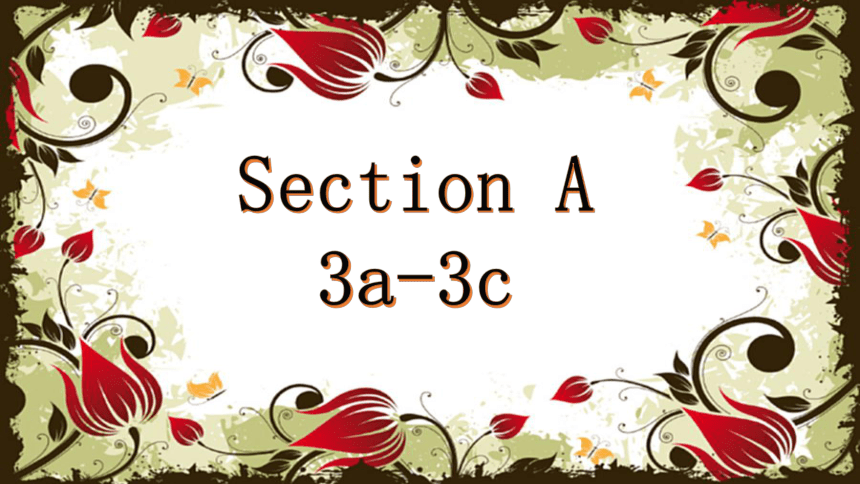

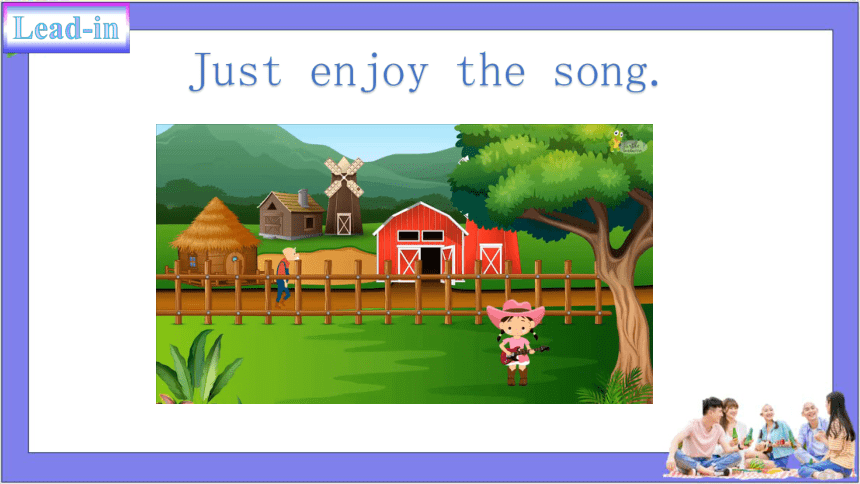
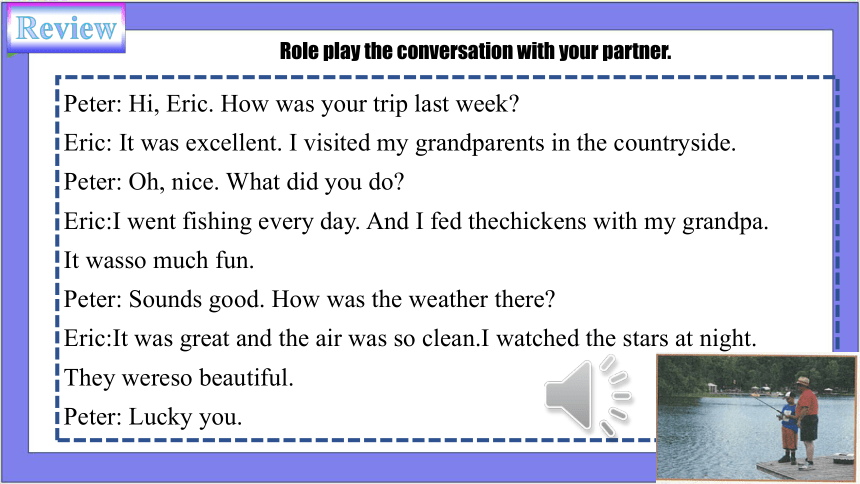
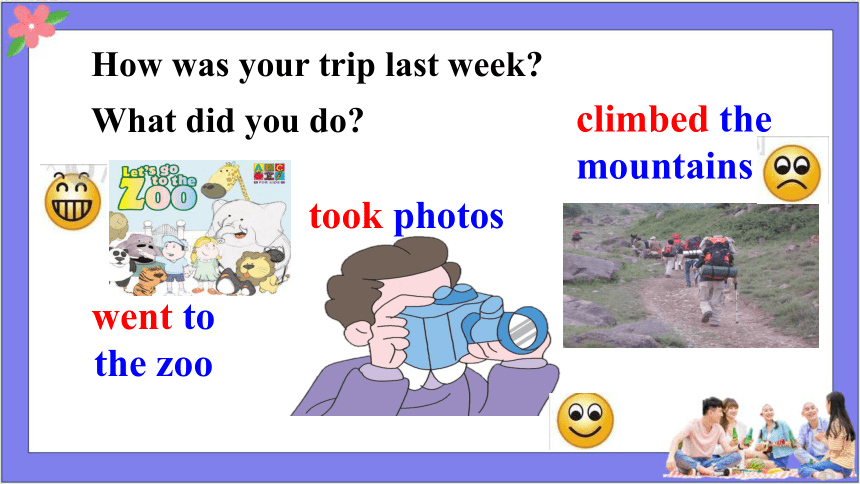
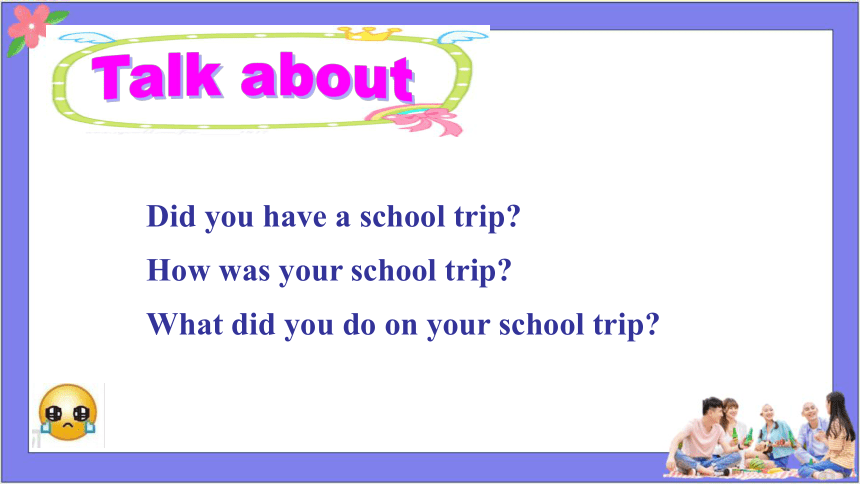
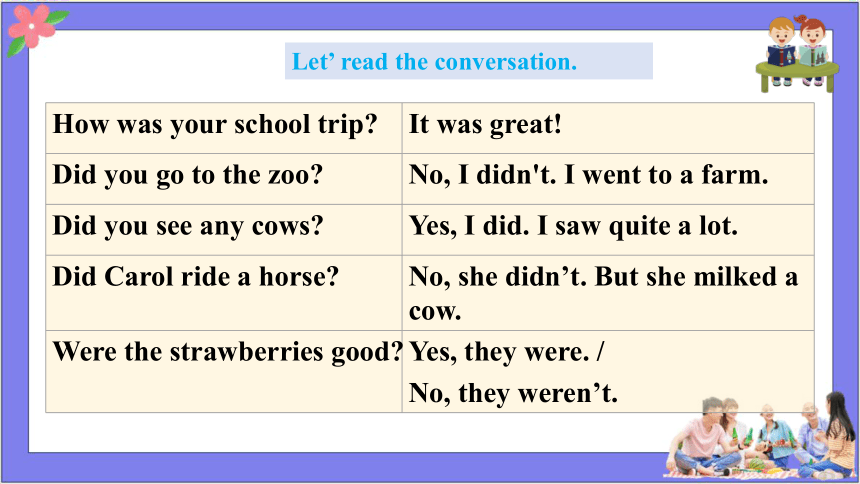
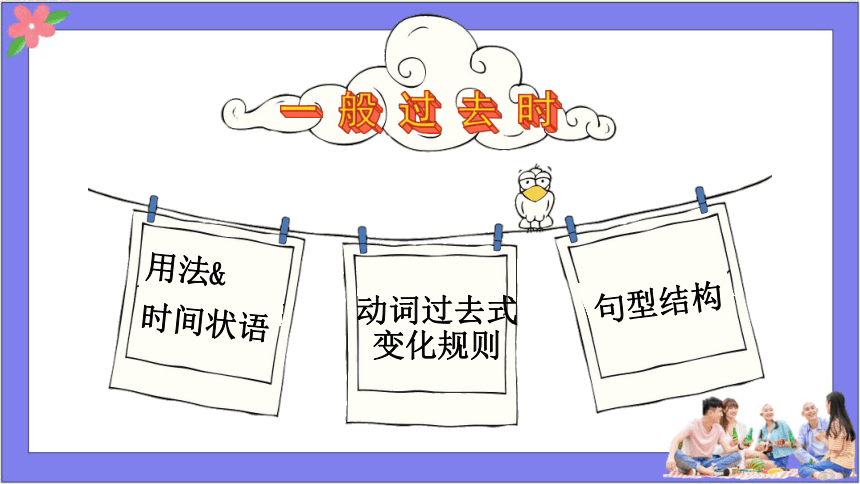
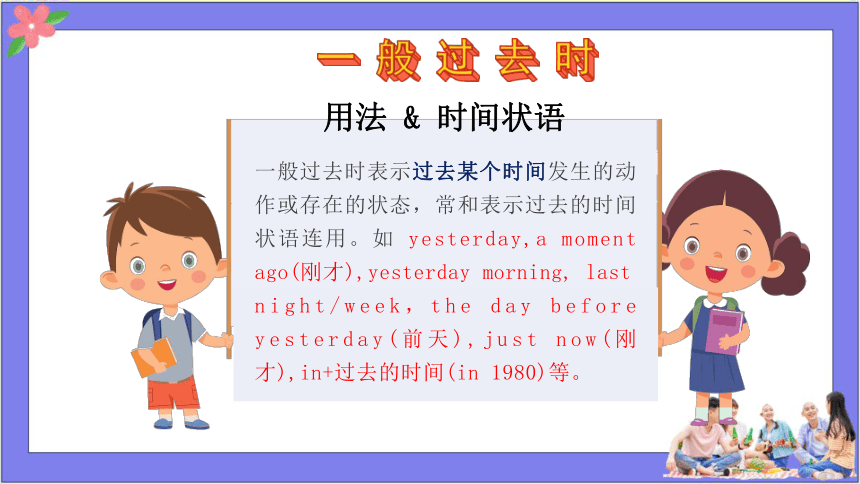
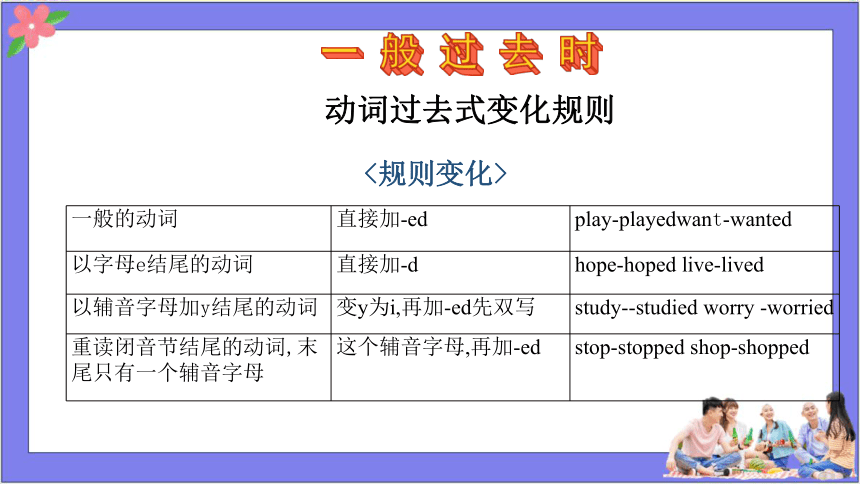
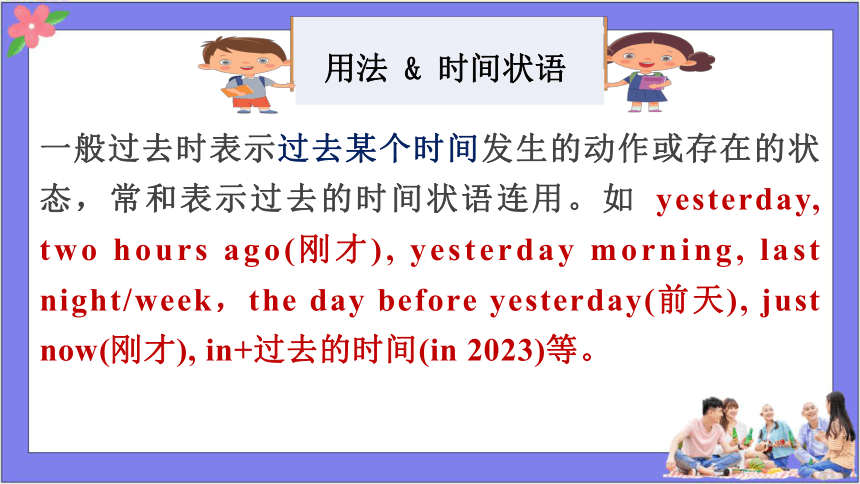
文档简介
(共38张PPT)
Unit 11
How was your school trip
Section A
3a-3c
01
02
03
04
语言能力
思维品质
文化意识
学习能力
围绕Eric与Peter谈论关于Eric的trip,正确使用动词的一般过去时以及各种给关于一般过去时的的句型。能够认真阅读对话并找出对话中的细节信息,提升阅读能力。
学生根能够分辨对话中的一般过去时,提高思辨能力。在产出活动中,学生能够根据语境和自己的知识创造故事,提升创新思维能力。
通过学习一篇关于trip的对话,学生能够知道如何在周末平衡他们的生活和学习。
通过谈论用一般过去时编撰故事,保持学习英语的兴趣。积极主动参加产出活动,并使用英语表达自己的观点。
Just enjoy the song.
Lead-in
Role play the conversation with your partner.
Peter: Hi, Eric. How was your trip last week
Eric: It was excellent. I visited my grandparents in the countryside.
Peter: Oh, nice. What did you do
Eric:I went fishing every day. And I fed thechickens with my grandpa.
It wasso much fun.
Peter: Sounds good. How was the weather there
Eric:It was great and the air was so clean.I watched the stars at night.
They wereso beautiful.
Peter: Lucky you.
Review
climbed the mountains
How was your trip last week
What did you do
took photos
went to the zoo
Did you have a school trip
How was your school trip
What did you do on your school trip
Talk about
How was your school trip It was great!
Did you go to the zoo No, I didn't. I went to a farm.
Did you see any cows Yes, I did. I saw quite a lot.
Did Carol ride a horse No, she didn’t. But she milked a cow.
Were the strawberries good Yes, they were. /
No, they weren’t.
Let’ read the conversation.
一 般 过 去 时
句型结构
动词过去式
变化规则
用法&
时间状语
一 般 过 去 时
一般过去时表示过去某个时间发生的动作或存在的状态,常和表示过去的时间状语连用。如 yesterday,a moment ago(刚才),yesterday morning, last night/week,the day before yesterday(前天),just now(刚才),in+过去的时间(in 1980)等。
用法 & 时间状语
一 般 过 去 时
动词过去式变化规则
一般的动词 直接加-ed play-playedwant-wanted
以字母e结尾的动词 直接加-d hope-hoped live-lived
以辅音字母加y结尾的动词 变y为i,再加-ed先双写 study--studied worry -worried
重读闭音节结尾的动词,末尾只有一个辅音字母 这个辅音字母,再加-ed stop-stopped shop-shopped
<规则变化>
用法 & 时间状语
一般过去时表示过去某个时间发生的动作或存在的状态,常和表示过去的时间状语连用。如 yesterday, two hours ago(刚才), yesterday morning, last night/week,the day before yesterday(前天), just now(刚才), in+过去的时间(in 2023)等。
five days
three hours
two years
ago
just now
in +过去时间
句型结构
(1) 含be动词的一般过去时的句式
①肯定句主语+was/were十其他.
Our school trip was terrible last week.
They were busy in 2023.
②否定句:主语+was not(wasn't)/were not(weren't)十其他.
Our school trip wasn’t terrible last week.
They weren’t busy in 2023.
句型结构
④特殊疑问句:疑问词十was/were十主语十其他
How was your school trip
你的学校旅行怎么样
③一般疑问句为“Was/Were十主语十其他 ”。
肯定回答用“Yes,主语+was/were.
否定回答用“No,主语+wasn't/weren't.”
-Were you at home yesterday 昨天你在家吗
-No, I wasn‘t. 不,我不在家。
句型结构
①肯定句:主语十动词过去式十其他.
They watched an interesting TV show yesterday.
昨天他们观看了一个有趣的电视节目。
②否定句:主语+did not/didn't十动词原形十其他.
They didn’t watch an interesting TV show yesterday.
(2) 含实义动词的一般过去时的句式
句型结构
③一般疑问句为“Did+主语十动词原形十其他 ”。
肯定回答常用“Yes,主语+did,” 否定回答常用“No,主语+didn’t.”
Did they watch an interesting TV show yesterday
Yes, they did. No, they didn’t.
④特殊疑问句:疑问词+did+主语十动词原形十其他
When did they watch an interesting TV show
They watched an interesting TV show yesterday.
1.play 2.visit
3.climb 4.pick 5.study 6.worry 7.stop 8.do 9.are 10.have
___________
___________
___________
___________
___________
___________
______________________
___________
___________
11.eat 12.buy 13.feed 14.see 15.get 16.grow 17.come 18.is 19.take 20.ride
___________
___________
___________
___________
___________
___________
___________
___________
___________
___________
played
visited
climbed
picked
studied
worried
stopped
did
were
had
ate
bought
fed
saw
got
grew
came
was
took
rode
动词的过去式
动词过去式变化规则
一般的动词 直接加-ed play-played /d/
want-wanted /id/
以字母e结尾的动词 直接加-d hope-hoped /t/
live-lived /d/
以辅音字母加y结尾的动词 变y为i, 再加-ed study-studied /d/
worry –worried /d/
重读闭音节结尾的动词,末尾只有一个辅音字母 双写这个辅音字母, 再加-ed stop-stopped /t/
shop-shopped /t/
<规则变化>
不规则动词的过去式变化各异,没有统一的规则,但也并非一点规律没有,下面介绍一部分动词过去式的记忆规律。
①动词过去式,过去分词与动词原形一样。
如:let-let-let,put-put-put,cut-cut-cut。
②遇见i改为a, (过去分词变为u)。
如:swim-swam-swum, sing-sang-sung, begin-began-begun。
③过去式以ought和aught结尾的单词(有a则a, 无a 则o),
如:bring-brought-brought, buy-bought-bought,
think-thought-thought, teach –taught-taught.
<不规则变化>
④中间去e末尾加t,
如:feel-felt-felt, keep-kept-kept, sleep-slept-slept,
sweep-swept-swept, meet-met-met.
⑤把i変为o, (过去分词加en)
如:ride –rode-ridden, drive –drove-driven,
write –wrote-written。
⑥ow/aw变为ew, (过去分词在原形的后面加n)
如:know-knew-known, grow-grew-grown,
throw-threw-thrown。
<不规则变化>
⑦以d结尾的词,把d变成t,
如:build-built-built, lend-lent-lent,
send-sent-sent, spend-spent-spent。
⑧be动词的过去式有两种形式,主语是第一、三人称单数形式用 was, 其他人称用 were。
am/is –was-been are-were-been
<不规则变化>
Complete Jim’s letter on the left and Bill’s reply on the right.
3a
Dear Bill,
How _____ (is) your school trip yesterday _____ (Do) you _____ (go) to the zoo _____ (do) you take any photos _____ (Do) you _____ (see) any interesting animals I ______ (go) to the zoo last year and it ______ (is) a lot of fun.
Jim
was
Did
go
Did
Did
see
went
was
Complete Jim’s letter on the left and Bill’s reply on the right.
3a
Dear Jim,
My school trip ______ (is) great! We ______ (have) so much fun!
We _______ (go) to Green Park. We _______ (climb) the mountains there and _____ (see) a lot of flowers. We ______ (eat) our lunch under some trees and ______ (play) some games after that. But at about two o’clock, it ______ (get) very cloudy and we _______ (worry) it would rain. Luckily, it ______ (do not), and the sun ______ (come) out again!
Bill
was
had
went
climbed
saw
ate
played
got
worried
didn’t
came
Make up a stroy. Each student adds a sentence.
3b
The weather was beautiful.
We went fishing.
Last week I visited my aunt’s house.
1
It was so much fun. 那真是挺好玩的。
要点 1
so much 意为“如此多;这么多”,一般用于修饰不可数名词或动词。
例: You talked so much. 你说得太多了。
知识拓展
so many“这么多;如此多”,常用来修饰可数名词复数。
例: He had so many friends in the city.在这个城市里,他有这么多的朋友。
要点 2
fun 此处作不可数名词,意为“乐趣;开心;有趣的人或事”,其前常用 great,much,a lot of等修饰,用来加强语气。
例: Skating is great fun.滑冰是件很有趣的事情。
2
....we worried it would rain.….我们担心会下雨
worried 为 worry 的过去式,worry 此处作及物动词,意为“担心;担忧”,后面常接宾语从句。worry还可用作不及物动词,意为“忧虑,担心”,后接宾语时,常加 about.worry about 意为“担心”
例:I worry that I won't get into college. 我担心自己进不了大学
知识拓展
worried 形容词,意为“担心的;担忧的”。常用短语:be worried about 意为“担心”
3
Luckily, it didn't, and the sun came out again! 幸运的是,没有下雨,并且太阳又出来了!
luckily 副词,意为“幸运地;好运地”,在句中作状语,一般置于句首。
例: Luckily, the police came in time and saved the children.幸运的是,警察及时赶到救了那些孩子。
come out 意为“出来”,其中 out 为副词
例: The sun is coming out. 太阳就要出来了。
知识拓展 :come out 的其他含义
①(花)开放 例: The flowers begin to come out. 花儿开始开放。
②出版;发表 例: His first book came out in 2003.他的第一本书于 2003 年出版了
③透露,传出 例: The truth came out at last. 终于真相大白了
1. visit ________(过去式)
2. photo ________(复数)
3. take ________(反义词)
4. put ________(过去式)
5. pour __________(现在分词)
6. wish ________(复数)
7. fun ________(形容词)
visited
photos
bring
put
pouring
wishes
funny
fed
horses
went
did
watched
saw
8. feed______(过去式)
9. horse ________(复数)
10. go _______ (过去式)
11. do _______ (过去式)
12. watch___________ (过去式)
13. see _______ (过去式)
按要求写出下列各词:
一、完成句子
1.Alice studied English last night. (改为一般疑问句)
Alice English last night
2.David did some housework last Sunday morning. (改为否定句)
David housework last Sunday morning.
Did study
didn't do any
3.Our school trip was very great. (对画线部分提问)
your school trip
4.She climbed Mount Meng last weekend. (对画线部分提问)
she last weekend
5.Frank rides his bike to school every day. (用yesterday代替every day改写句子)
Frank his bike to school .
How was
What did do
rode yesterday
二、用所给单词的正确形式填空
1.We ______ (go) to the zoo yesterday.
2.______ you ______ (visit) your grandparents
last Spring Festival
3.It ______ (be) Ben's birthday last Friday.
4.He _________ ( play) soccer now, but they ______ (play) basketball just now.
went
Did visit
was
is playing
played
二、用所给单词的正确形式填空
5.—What _________ (do) Mike do on the farm yesterday
—He ______ (milk) cows.
6.We ______ (be) busy last Sunday.
7. They ______________ (not see) their friends
yesterday.
8. She ___________(exercise)in the park last
Sunday. She always __________ (do) sports in the park on weekends.
did
were
milked
were
exercised
does
动词过去式
变化规则
一般过去时表示过去某个时间发生的动作或存在的状态,常和表示过去的时间状语连用。
一般过去时
句型结构
用法&时间状语
含实义动词的一般过去时的句式
含be动词的一般过去时的句式
Level B:
Master what you have learned in this lesson.
Level A:
Finish the extra exercise in your workbook
Thank you !
Unit 11
How was your school trip
Section A
3a-3c
01
02
03
04
语言能力
思维品质
文化意识
学习能力
围绕Eric与Peter谈论关于Eric的trip,正确使用动词的一般过去时以及各种给关于一般过去时的的句型。能够认真阅读对话并找出对话中的细节信息,提升阅读能力。
学生根能够分辨对话中的一般过去时,提高思辨能力。在产出活动中,学生能够根据语境和自己的知识创造故事,提升创新思维能力。
通过学习一篇关于trip的对话,学生能够知道如何在周末平衡他们的生活和学习。
通过谈论用一般过去时编撰故事,保持学习英语的兴趣。积极主动参加产出活动,并使用英语表达自己的观点。
Just enjoy the song.
Lead-in
Role play the conversation with your partner.
Peter: Hi, Eric. How was your trip last week
Eric: It was excellent. I visited my grandparents in the countryside.
Peter: Oh, nice. What did you do
Eric:I went fishing every day. And I fed thechickens with my grandpa.
It wasso much fun.
Peter: Sounds good. How was the weather there
Eric:It was great and the air was so clean.I watched the stars at night.
They wereso beautiful.
Peter: Lucky you.
Review
climbed the mountains
How was your trip last week
What did you do
took photos
went to the zoo
Did you have a school trip
How was your school trip
What did you do on your school trip
Talk about
How was your school trip It was great!
Did you go to the zoo No, I didn't. I went to a farm.
Did you see any cows Yes, I did. I saw quite a lot.
Did Carol ride a horse No, she didn’t. But she milked a cow.
Were the strawberries good Yes, they were. /
No, they weren’t.
Let’ read the conversation.
一 般 过 去 时
句型结构
动词过去式
变化规则
用法&
时间状语
一 般 过 去 时
一般过去时表示过去某个时间发生的动作或存在的状态,常和表示过去的时间状语连用。如 yesterday,a moment ago(刚才),yesterday morning, last night/week,the day before yesterday(前天),just now(刚才),in+过去的时间(in 1980)等。
用法 & 时间状语
一 般 过 去 时
动词过去式变化规则
一般的动词 直接加-ed play-playedwant-wanted
以字母e结尾的动词 直接加-d hope-hoped live-lived
以辅音字母加y结尾的动词 变y为i,再加-ed先双写 study--studied worry -worried
重读闭音节结尾的动词,末尾只有一个辅音字母 这个辅音字母,再加-ed stop-stopped shop-shopped
<规则变化>
用法 & 时间状语
一般过去时表示过去某个时间发生的动作或存在的状态,常和表示过去的时间状语连用。如 yesterday, two hours ago(刚才), yesterday morning, last night/week,the day before yesterday(前天), just now(刚才), in+过去的时间(in 2023)等。
five days
three hours
two years
ago
just now
in +过去时间
句型结构
(1) 含be动词的一般过去时的句式
①肯定句主语+was/were十其他.
Our school trip was terrible last week.
They were busy in 2023.
②否定句:主语+was not(wasn't)/were not(weren't)十其他.
Our school trip wasn’t terrible last week.
They weren’t busy in 2023.
句型结构
④特殊疑问句:疑问词十was/were十主语十其他
How was your school trip
你的学校旅行怎么样
③一般疑问句为“Was/Were十主语十其他 ”。
肯定回答用“Yes,主语+was/were.
否定回答用“No,主语+wasn't/weren't.”
-Were you at home yesterday 昨天你在家吗
-No, I wasn‘t. 不,我不在家。
句型结构
①肯定句:主语十动词过去式十其他.
They watched an interesting TV show yesterday.
昨天他们观看了一个有趣的电视节目。
②否定句:主语+did not/didn't十动词原形十其他.
They didn’t watch an interesting TV show yesterday.
(2) 含实义动词的一般过去时的句式
句型结构
③一般疑问句为“Did+主语十动词原形十其他 ”。
肯定回答常用“Yes,主语+did,” 否定回答常用“No,主语+didn’t.”
Did they watch an interesting TV show yesterday
Yes, they did. No, they didn’t.
④特殊疑问句:疑问词+did+主语十动词原形十其他
When did they watch an interesting TV show
They watched an interesting TV show yesterday.
1.play 2.visit
3.climb 4.pick 5.study 6.worry 7.stop 8.do 9.are 10.have
___________
___________
___________
___________
___________
___________
______________________
___________
___________
11.eat 12.buy 13.feed 14.see 15.get 16.grow 17.come 18.is 19.take 20.ride
___________
___________
___________
___________
___________
___________
___________
___________
___________
___________
played
visited
climbed
picked
studied
worried
stopped
did
were
had
ate
bought
fed
saw
got
grew
came
was
took
rode
动词的过去式
动词过去式变化规则
一般的动词 直接加-ed play-played /d/
want-wanted /id/
以字母e结尾的动词 直接加-d hope-hoped /t/
live-lived /d/
以辅音字母加y结尾的动词 变y为i, 再加-ed study-studied /d/
worry –worried /d/
重读闭音节结尾的动词,末尾只有一个辅音字母 双写这个辅音字母, 再加-ed stop-stopped /t/
shop-shopped /t/
<规则变化>
不规则动词的过去式变化各异,没有统一的规则,但也并非一点规律没有,下面介绍一部分动词过去式的记忆规律。
①动词过去式,过去分词与动词原形一样。
如:let-let-let,put-put-put,cut-cut-cut。
②遇见i改为a, (过去分词变为u)。
如:swim-swam-swum, sing-sang-sung, begin-began-begun。
③过去式以ought和aught结尾的单词(有a则a, 无a 则o),
如:bring-brought-brought, buy-bought-bought,
think-thought-thought, teach –taught-taught.
<不规则变化>
④中间去e末尾加t,
如:feel-felt-felt, keep-kept-kept, sleep-slept-slept,
sweep-swept-swept, meet-met-met.
⑤把i変为o, (过去分词加en)
如:ride –rode-ridden, drive –drove-driven,
write –wrote-written。
⑥ow/aw变为ew, (过去分词在原形的后面加n)
如:know-knew-known, grow-grew-grown,
throw-threw-thrown。
<不规则变化>
⑦以d结尾的词,把d变成t,
如:build-built-built, lend-lent-lent,
send-sent-sent, spend-spent-spent。
⑧be动词的过去式有两种形式,主语是第一、三人称单数形式用 was, 其他人称用 were。
am/is –was-been are-were-been
<不规则变化>
Complete Jim’s letter on the left and Bill’s reply on the right.
3a
Dear Bill,
How _____ (is) your school trip yesterday _____ (Do) you _____ (go) to the zoo _____ (do) you take any photos _____ (Do) you _____ (see) any interesting animals I ______ (go) to the zoo last year and it ______ (is) a lot of fun.
Jim
was
Did
go
Did
Did
see
went
was
Complete Jim’s letter on the left and Bill’s reply on the right.
3a
Dear Jim,
My school trip ______ (is) great! We ______ (have) so much fun!
We _______ (go) to Green Park. We _______ (climb) the mountains there and _____ (see) a lot of flowers. We ______ (eat) our lunch under some trees and ______ (play) some games after that. But at about two o’clock, it ______ (get) very cloudy and we _______ (worry) it would rain. Luckily, it ______ (do not), and the sun ______ (come) out again!
Bill
was
had
went
climbed
saw
ate
played
got
worried
didn’t
came
Make up a stroy. Each student adds a sentence.
3b
The weather was beautiful.
We went fishing.
Last week I visited my aunt’s house.
1
It was so much fun. 那真是挺好玩的。
要点 1
so much 意为“如此多;这么多”,一般用于修饰不可数名词或动词。
例: You talked so much. 你说得太多了。
知识拓展
so many“这么多;如此多”,常用来修饰可数名词复数。
例: He had so many friends in the city.在这个城市里,他有这么多的朋友。
要点 2
fun 此处作不可数名词,意为“乐趣;开心;有趣的人或事”,其前常用 great,much,a lot of等修饰,用来加强语气。
例: Skating is great fun.滑冰是件很有趣的事情。
2
....we worried it would rain.….我们担心会下雨
worried 为 worry 的过去式,worry 此处作及物动词,意为“担心;担忧”,后面常接宾语从句。worry还可用作不及物动词,意为“忧虑,担心”,后接宾语时,常加 about.worry about 意为“担心”
例:I worry that I won't get into college. 我担心自己进不了大学
知识拓展
worried 形容词,意为“担心的;担忧的”。常用短语:be worried about 意为“担心”
3
Luckily, it didn't, and the sun came out again! 幸运的是,没有下雨,并且太阳又出来了!
luckily 副词,意为“幸运地;好运地”,在句中作状语,一般置于句首。
例: Luckily, the police came in time and saved the children.幸运的是,警察及时赶到救了那些孩子。
come out 意为“出来”,其中 out 为副词
例: The sun is coming out. 太阳就要出来了。
知识拓展 :come out 的其他含义
①(花)开放 例: The flowers begin to come out. 花儿开始开放。
②出版;发表 例: His first book came out in 2003.他的第一本书于 2003 年出版了
③透露,传出 例: The truth came out at last. 终于真相大白了
1. visit ________(过去式)
2. photo ________(复数)
3. take ________(反义词)
4. put ________(过去式)
5. pour __________(现在分词)
6. wish ________(复数)
7. fun ________(形容词)
visited
photos
bring
put
pouring
wishes
funny
fed
horses
went
did
watched
saw
8. feed______(过去式)
9. horse ________(复数)
10. go _______ (过去式)
11. do _______ (过去式)
12. watch___________ (过去式)
13. see _______ (过去式)
按要求写出下列各词:
一、完成句子
1.Alice studied English last night. (改为一般疑问句)
Alice English last night
2.David did some housework last Sunday morning. (改为否定句)
David housework last Sunday morning.
Did study
didn't do any
3.Our school trip was very great. (对画线部分提问)
your school trip
4.She climbed Mount Meng last weekend. (对画线部分提问)
she last weekend
5.Frank rides his bike to school every day. (用yesterday代替every day改写句子)
Frank his bike to school .
How was
What did do
rode yesterday
二、用所给单词的正确形式填空
1.We ______ (go) to the zoo yesterday.
2.______ you ______ (visit) your grandparents
last Spring Festival
3.It ______ (be) Ben's birthday last Friday.
4.He _________ ( play) soccer now, but they ______ (play) basketball just now.
went
Did visit
was
is playing
played
二、用所给单词的正确形式填空
5.—What _________ (do) Mike do on the farm yesterday
—He ______ (milk) cows.
6.We ______ (be) busy last Sunday.
7. They ______________ (not see) their friends
yesterday.
8. She ___________(exercise)in the park last
Sunday. She always __________ (do) sports in the park on weekends.
did
were
milked
were
exercised
does
动词过去式
变化规则
一般过去时表示过去某个时间发生的动作或存在的状态,常和表示过去的时间状语连用。
一般过去时
句型结构
用法&时间状语
含实义动词的一般过去时的句式
含be动词的一般过去时的句式
Level B:
Master what you have learned in this lesson.
Level A:
Finish the extra exercise in your workbook
Thank you !
同课章节目录
- Unit 1 Can you play the guitar?
- Section A
- Section B
- Unit 2 What time do you go to school?
- Section A
- Section B
- Unit 3 How do you get to school?
- Section A
- Section B
- Unit 4 Don't eat in class.
- Section A
- Section B
- Unit 5 Why do you like pandas?
- Section A
- Section B
- Unit 6 I'm watching TV.
- Section A
- Section B
- Review of Units 1-6
- Unit 7 It's raining!
- Section A
- Section B
- Unit 8 Is there a post office near here?
- Section A
- Section B
- Unit 9 What does he look like?
- Section A
- Section B
- Unit 10 I'd like some noodles.
- Section A
- Section B
- Unit 11 How was your school trip?
- Section A
- Section B
- Unit 12 What did you do last weekend?
- Section A
- Section B
